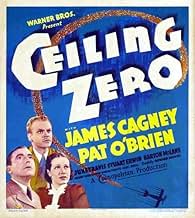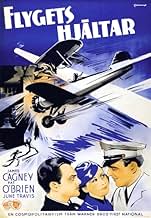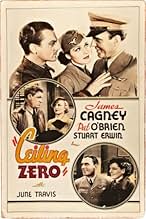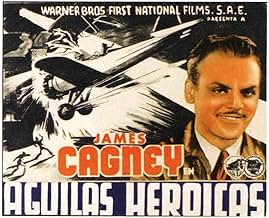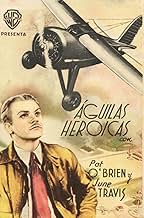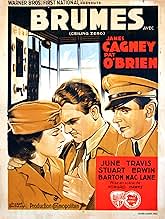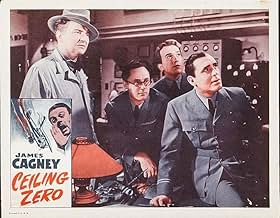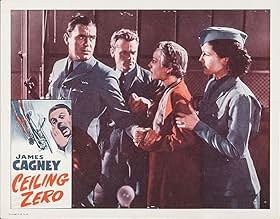Füge eine Handlung in deiner Sprache hinzuWar veteran pilots Dizzy Davis, Texas Clark and Jake Lee are working in an airline in Newark. Dizzy is flirting with the girlfriend of a younger pilot and, due to this, he feigns illness to ... Alles lesenWar veteran pilots Dizzy Davis, Texas Clark and Jake Lee are working in an airline in Newark. Dizzy is flirting with the girlfriend of a younger pilot and, due to this, he feigns illness to get Texas to take his flight assignment to Cleveland. Returning from Cleveland to Newark, ... Alles lesenWar veteran pilots Dizzy Davis, Texas Clark and Jake Lee are working in an airline in Newark. Dizzy is flirting with the girlfriend of a younger pilot and, due to this, he feigns illness to get Texas to take his flight assignment to Cleveland. Returning from Cleveland to Newark, Texas' plane crashes attempting to land on the airfield under extremely bad weather circum... Alles lesen
- Auszeichnungen
- 1 wins total
- Smiley
- (as Dick Purcell)
- Transportation Agent
- (as Gordon Elliott)
Empfohlene Bewertungen
Hawks' preliminary study to "Only Angels Have Wings" is an absorbing aviator film which does not surprise very much though. A troup of airmen, intrepidly looking in death's eye, between the flight sequences, it's a drama of interiors. Duty and honor, lust and loyalty of professionals, a question of fast-paced flow of words and swifter movements. Hawks' (typical) flawed hero, played by the master of nimble gestures, James Cagney, is small and every handling an expression of his being. Although he flirts with June Travis and tries to impose his room keys on her, his love applies to his understanding chief and friend, the plagued Pat O'Brien.
Unfortunately, all this comes along as pretty conventional (particularly for a Hawks film), but is entertaining nonetheless with a great James Cagney in the lead.
But there is more psychologically it works a treat too. Jake and Dizzy share the same heroic wartime background. It emerges that they share the same taste in women too. To some extent, they represent two aspects of the same character it is significant that during the climactic moments of Texas' final approach to the airfield, they keep switching roles, with first one then the other taking charge of the situation. Both of them also show the same moral flexibility Dizzy by exchanging places with Tommy's boyfriend, Jake by being willing to distort his professional judgement to save Dizzy's flying career.
In spite of all of this, 'Ceiling Zero' cannot really be placed at the same level as the truly great Hawks masterpieces El Dorado, To Have & Have Not, Bringing Up Baby and, significantly, Only Angels Have Wings. At the end of the film, one doesn't feel that one has really known the characters. But, considering its vintage, it is an entirely worthy work that gives us clear indications of the wonders to come.
It should be absolutely essential viewing for anyone wishing to acquaint themselves with the an important work of one of America's greatest artists, in any discipline, of the twentieth century. Another interesting parallel is Ford's 'Air Mail'which has a similar story also originating in Frank Wead.
Hawks had a love affair with aviation films. He was an instructor for Signal Corps pilots during World War One, inspiring him to produce flyboy movies such as 1928 'Air Circus,' 1930 "The Dawn Patrol," and 1939 "Only Angels Have Wings," his last one containing similar storylines as "Ceiling Zero." Scriptwriter Frank 'Spig' Wead, also a WW1 aviator, wrote both the play of the same name as well as the script. Wead, an inventor for several airplane innovations, turned to writing when he became paralyzed falling down stairs while responding to his daughter's crying. The John Wayne movie, 1957's "The Wings of Eagles," directed by John Ford, is a biopic on Wead, who was good friends with the director.
Wead addressed two themes in "Ceiling Zero." Set in the year 1930, the movie focuses on the younger, yet vastly inexperienced pilots vying against the much older WW1 vets for aviator jobs. Dizzy Davis (James Cagney) and Tex Clarke (Stuart Erwin) are a pair of daredevil war pilots who fly in any type of weather, including ceiling zero, where visibility is nil. The younger pilots are skittish about the weather, as exhibited by one tenderfoot who abandons his plane when he can't see his hand in front of his face.
The secondary theme is the introduction of a novel form of deicing an airplane in flight when freezing rain, snow or drizzle dangerously forms ice on the airplane. Mixed in with all this excitement is cinema's proverbial romantic angle, which includes Jack Lee (O'Brien), who's the Newark, N. J. branch manager for Federal Airlines and a young female pilot "Tommy" Thomas (June Travis). Famous aviator Amelia Earhart gave lessons in flying, navigating and parachute jumping to Travis as well as to Cagney and O'Brien before the production in preparation for the film. Close to 70 per cent of the shots takes place in Jack's dispatcher office (filming never left the Warner Brother's studio and backlot.). Hawks's ability to create such a thrilling aviation film, all without computerized blue screens, was a talent very few movie directors in his day were capable of matching.
For those who've seen Wings of Eagles, they know that Spig Wead was a navy pilot who set all kinds of aviation records before becoming paralyzed with a broken neck due to a fall down some stairs in his home. After that Wead turned to writing and published all kinds of articles, stories, and screenplays mostly relating to aviation.
Ceiling Zero was Wead's one attempt at a Broadway play. It ran for three months on Broadway in 1935 with John Litel and Osgood Perkins in the roles played by James Cagney and Pat O'Brien respectively. It got good critical acclaim, but a short Broadway run as did a lot of plays during the Depression.
O'Brien is the operations manager of an airline and Cagney is an old friend who is an irresponsible but talented flyer. Superficially those seem like parts tailor made for Cagney and O'Brien, but this is in fact a serious drama so their usual hijinks are not present in this film as well they shouldn't have been.
Cagney and O'Brien had done another film about aviation, Devil Dogs of the Air which is far more lighthearted, but which Warner Brothers invested far more production values. For the most part, Ceiling Zero is a photographed stage play with some scenes that are clearly done on the backlot.
I'm surprised that Wead who did in fact write more for the screen didn't push for a bigger budget and some location shooting for his play. On the plus side Director Howard Hawks handles his cast real well and you can see some influences for the later and better Only Angels Have Wings.
Wusstest du schon
- WissenswertesAfter the 1993 VHS release, legal complications reared their ugly heads, and this title was taken off the market; as a result there has, so far, never been a DVD release, and except for a single presentation in May 1994, it's never been broadcast on Turner Classic Movies. The remake, International Squadron (1941), also fell into the same legal quagmire and has never been released on VHS nor DVD nor aired on TCM. These are the only James Cagney and Ronald Reagan titles to remain legally unavailable for public viewing at this time.
- Zitate
Dizzy Davis: What's the matter?
Tommy Thomas: Mama told me when I'm tempted to do something to count to ten. Five, six ... Can you wait?
- VerbindungenReferenced in Let's Stalk Spinach (1951)
- SoundtracksDear Old Pal of Mine
(uncredited)
Music by Gitz Rice
Lyrics by Harold A. Robe
Top-Auswahl
- How long is Ceiling Zero?Powered by Alexa
Details
- Erscheinungsdatum
- Herkunftsland
- Sprache
- Auch bekannt als
- Ceiling Zero
- Drehorte
- Produktionsfirmen
- Weitere beteiligte Unternehmen bei IMDbPro anzeigen
- Laufzeit
- 1 Std. 35 Min.(95 min)
- Farbe
- Sound-Mix
- Seitenverhältnis
- 1.37 : 1

